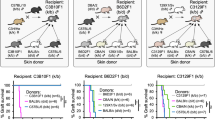Abstract
Previously, we and others have demonstrated in several animal models that the establishment of stable haematopoietic chimerism through allogeneic bone marrow transfusion provides an effective means for the development of specific transplantation tolerance. However, a major limitation to the clinical application of allogeneic bone marrow transfusion in immunosuppressed recipients for induction of tolerance to solid grafts, is the risk of graft-versus-host disease (GVHD). Therefore, it is important to identify the cell population needed for the induction of mixed chimerism and tolerance. Haematopoietic stem cells have the capacity of self-renewal and multilineage differentiation, and have been shown to reduce the risk of GVHD. We studied transfusion of two rich sources of stem cells, namely allogeneic fetal liver cells and a subset of purified bone marrow-derived progenitor cells (c-kit+) into anti-T cell monoclonal antibody-treated, low-dose irradiated recipient mice. Our data revealed that stable multilineage mixed chimerism and permanent donor-specific tolerance for skin, even when transplanted directly following conditioning, can be successfully achieved in this way, with no signs of GVHD.
Similar content being viewed by others
Author information
Authors and Affiliations
Rights and permissions
About this article
Cite this article
de Vries-van der Zwan, A., van der Pol, M., Besseling, A. et al. Haematopoietic stem cells can induce specific skin graft acceptance across full MHC barriers. Bone Marrow Transplant 22, 91–98 (1998). https://doi.org/10.1038/sj.bmt.1701277
Received:
Accepted:
Published:
Issue Date:
DOI: https://doi.org/10.1038/sj.bmt.1701277
- Springer Nature Limited
Keywords
This article is cited by
-
Towards a myeloablative regimen with clinical potential: I. Treosulfan conditioning and bone marrow transplantation allow induction of donor-specific tolerance for skin grafts across full MHC barriers
Bone Marrow Transplantation (2003)
-
Immunobiology of allogeneic peripheral blood mononuclear cells mobilized with granulocyte-colony stimulating factor
Bone Marrow Transplantation (2000)




